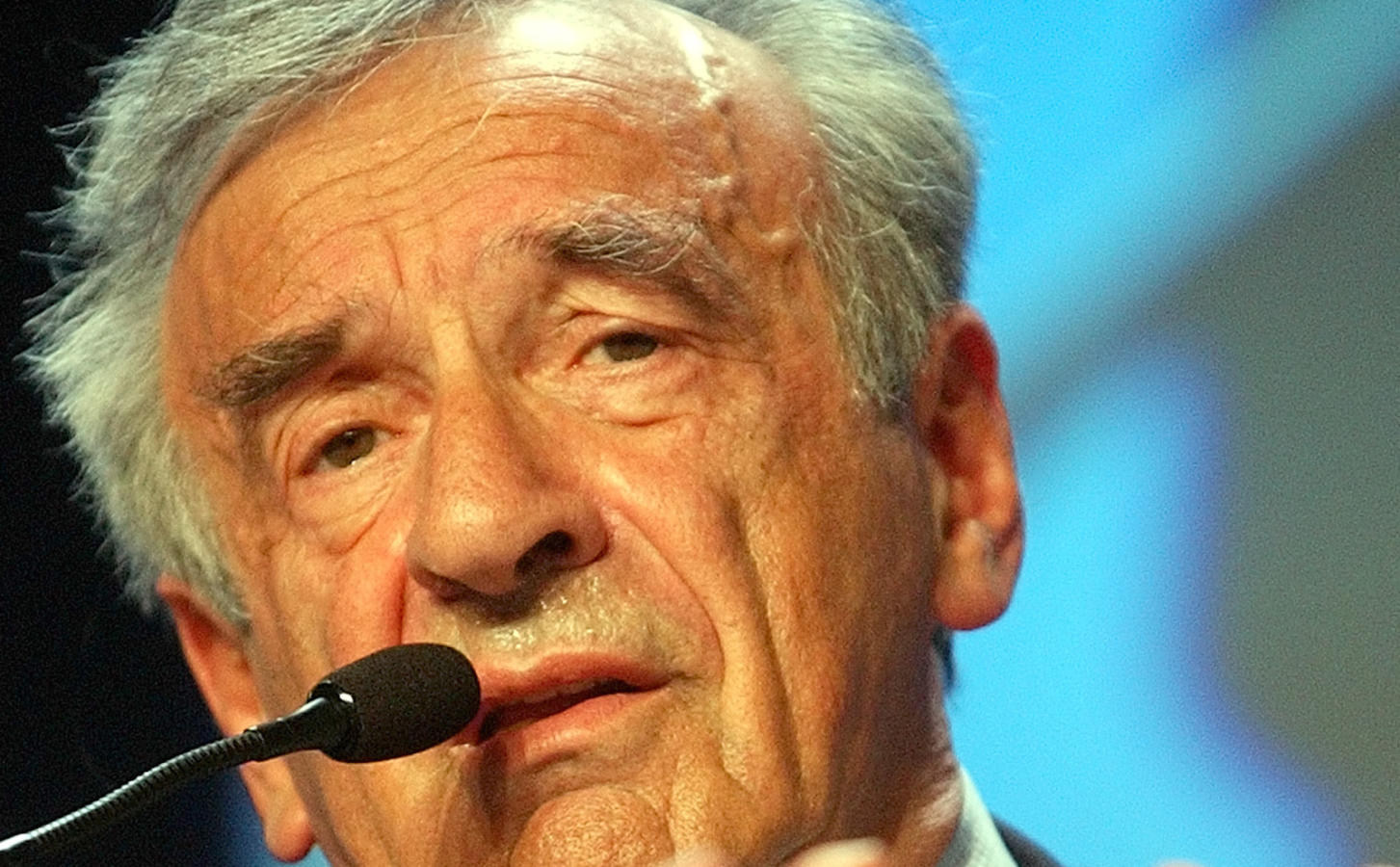“When Israel went into exile, so did its language,” Elie Wiesel observes in his book Messengers of God.
Elie Wiesel — Holocaust survivor, novelist, memoirist, and Nobel laureate — made a career out of documenting the exile of the Jews, creating a new language able to acknowledge and accommodate that expansive history.
Wiesel died in 2016. Read his obituary here.
He was the Holocaust survivor who devoted much of his life to the remembrance of the Nazi genocide. He was the writer who moonlit as an advocate. He was the novelist and memoirist who skirted the boundaries between fiction and nonfiction, with some books embracing elements of both. He was perhaps the most lauded writer in the world–so lauded, in fact, that some people may forget he was, in fact, a writer.

Help us keep Jewish knowledge accessible to millions of people around the world.
Your donation to My Jewish Learning fuels endless journeys of Jewish discovery. With your help, My Jewish Learning can continue to provide nonstop opportunities for learning, connection and growth.
Wiesel won the Nobel Peace Prize in 1986, honoring his efforts as an impassioned voice against injustice. Like so many other survivors, Wiesel transformed his experience at Auschwitz into a kind of moral code—one that takes the principle of “never again” as a starting point. Wiesel spoke out courageously against communism, the Rwandan genocide, and apartheid. “We must always take sides,” Wiesel said in his Nobel acceptance speech. “Neutrality helps the oppressor, never the victim. Silence encourages the tormentor, never the tormented.”
Formative Years
Elie Wiesel was born in Sighet, Romania, in 1928. When he was 12 years old, the town was reassigned to Hungarian rule, and in May 1944, Wiesel was deported to the Auschwitz concentration camp along with his parents and his sisters. Wiesel and his father were slave laborers at Auschwitz. His father died in January 1945 during a forced march to another camp, Buchenwald., and his mother and younger sister were murdered as well.
After the war, Wiesel moved to France, where he worked as a journalist. In the mid-1950s, Wiesel began to work on a book about his wartime years. No longer comfortable with Yiddish or Romanian as an expression of his thoughts, Wiesel chose to write in French. The 900-page manuscript was trimmed to a slim, semi-fictionalized account of life in Sighet and Auschwitz called Night.
The Long Night
Eliezer, Wiesel’s narrator in Night (1958), encounters a man named Moishe the Beadle in Sighet, who has been on one of the trains bound for the death camps, and miraculously survived. “I wanted to return to Sighet to describe to you my death so that you might ready yourselves while there is still time,” Moishe tells him, and there is a sense in which Wiesel’s project is much the same. After having seen his own figurative death, and enduring the all-too-literal death of his family, Wiesel reluctantly appointed himself the storyteller for the dead, their memory and their conscience. “Never shall I forget those moments which murdered my God and my soul and turned my dreams to dust,” Wiesel writes in Night. “Never shall I forget these things, even if I am condemned to live as long as God Himself. Never.” Night went on to become the most read of all books on the Holocaust
Wiesel’s artistic project was to document not just the Holocaust, but the terrors of life as a Jew in the mad 20th century. His second novel, Dawn (1961) — its title intended to reflect a partial lessening of the Holocaust’s darkness — delves into the psyche of a Jewish soldier, another survivor, who is given the task of executing a British officer. The archetypal Jew as victim brushes up against the Jew as aggressor, with Wiesel crafting a symbolic debate between past and future.
Elie Wiesel, Author
Later works would also toe the line between myth and reality, spinning Jewish history into a series of pointed fables. In “An Old Acquaintance,” a powerful story from his collection Legends of Our Time (1968), a survivor riding a Tel Aviv bus spots a Jewish kapo who had thrived in hell by collaborating with the Nazis. “And what about now?” the survivor asks, confronting his old tormentor. “Tell me, do you eat well? With appetite?”
Wiesel was a fabulist as much as a memoirist, and while Night (which many forget is officially a novel) was an impassioned testimony from the camps, much of Wiesel’s work was devoted to the perplexities of Jewish life and Jewish history. As an amateur biblical scholar, Wiesel retold familiar stories from the Bible in Messengers of God (1976). He transformed the legends of the early leaders and mystics into the elegant Souls on Fire (1982).
Human Rights Activist
Meanwhile, Wiesel also devoted himself to the conviction, informed by the Holocaust that Jews, and other downtrodden groups, could no longer be allowed to suffer quietly. Wiesel visited the Soviet Union in the mid-1960s, and The Jews of Silence (1966), his book on the degradations suffered by Soviet Jews, and refuseniks in particular, was hugely influential on the burgeoning Soviet Jewry movement in the United States. Wiesel was also an advocate for Kurdish rights, for the people of Cambodia, and against South African apartheid and ethnic cleansing in Yugoslavia.
Wiesel wrote more than 40 books, including two volumes of memoir: All Rivers Run to the Sea (1995) and And the Sea is Never Full (1999). He has also returned to fiction with works like A Mad Desire to Dance (2009), which echoes the philosophical questing of his earlier novels. While never a favorite of literary critics, many of whom considered his post-Night output to be didactic and lacking in novelistic flair, Wiesel’s work, particularly Night, struck an enduring chord with readers.
In his later years, Wiesel has been an impassioned supporter of international intervention in Darfur, arguing that the actions of government-sponsored militias in that region of Sudan are tantamount to genocide. Some criticized the Nobel committee for giving Wiesel the Nobel Peace Prize, as opposed to the literature prize, but Wiesel’s untiring dedication to serving as a voice for the voiceless proved the rightness of that judgment. Wiesel served as that voice, both for himself, and for those who came to accept him as the embodiment of our collective humanity.



